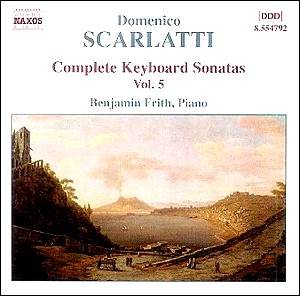Domenico Scarlatti was the sixth child of the famed
opera composer Alessandro Scarlatti. The Italian member of the "big
three" of baroque composers born in the year 1685 (Bach and Händel
being the other two), the junior Scarlatti studied chiefly in Venice,
where he worked for the exiled queen of Poland. He also spent much time
in Rome, where he met and competed against Händel in a keyboard
contest which turned out to be a draw, it being decided that Scarlatti
excelled at the harpsichord, and Händel at the organ.
For the majority of his professional career, he would
work in the service of the Spanish royal family, and it is from this
employment that his more than six hundred single movement exercises
or "sonatas" came into being. These works were most likely
written for the teaching of his pupil, the Infanta Maria Barbara who
would later become the Queen of Spain. There is a famous, humorous legend
about Scarlatti that says that in later life he had grown so obese that
he was unable to execute the cross-hand keyboard technique that he invented
because he was unable to clear his large girth to make the maneuver.
The Scarlatti sonatas are of infinite variety and color,
and of widely contrasting mood and temperament. Any grouping of a dozen
or so of these gems makes for an interesting recital in and of itself.
Benjamin Frith dashes off this sampling of sixteen works with tremendous
flair and panache. To the delight of these ears, he does not bog the
music down in displays of "performance practice," nor does
he attempt to make his concert grand sound like anything other than
a modern piano. Yet, he uses pedal sparingly, finds the proper balance
between contrapuntal voices, and brings these brief gems to life with
an infectious grace and elegance.
Frith has ample technique to make the busier passagework
sound easy. More engaging still is the manner in which he handles the
slower, more lyrical works. He knows how to make the piano sing, and
his legato, achieved mostly with the fingers and not the right foot,
is splendid. To sum it up, his playing is effervescent and lyrical,
bringing this music alive in a most enjoyable way.
Keith Anderson provides ample and informative notes,
and the sound quality is superb. A worthy addition to any collection.
Kevin Sutton
